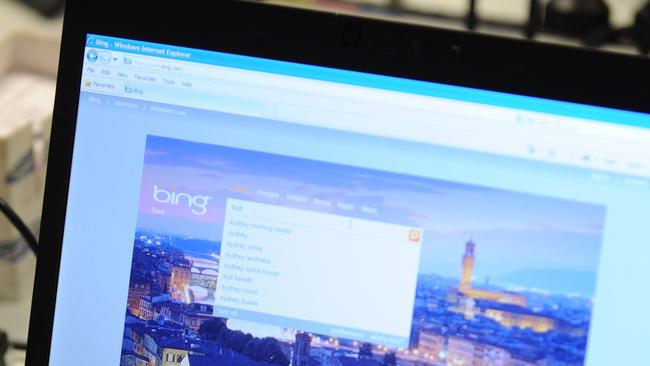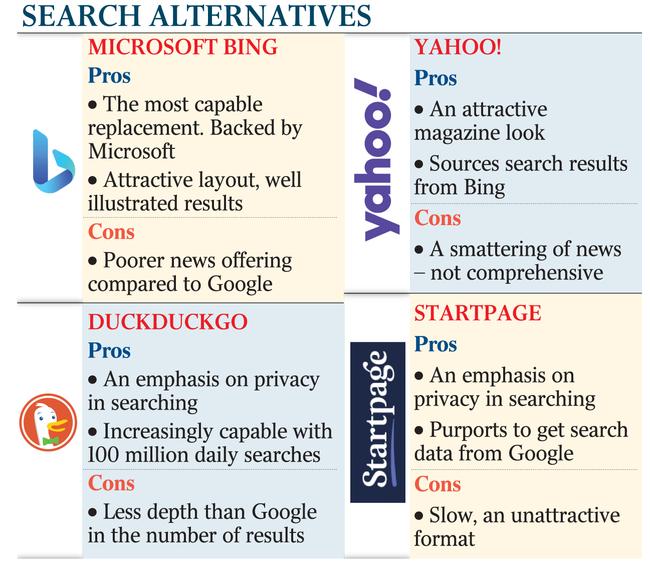Bing, DuckDuckGo, Yahoo!, Startpage among options if Google axes Search in Australia

Start your engines: search for more is just a browser away. DuckDuckGo, Microsoft Bing, Startpage, and Yahoo! are contenders. That’s if Google carries out its threat and withdraw its search engine from Australia.
Whether Google discontinues Search remains to be seen. It doesn’t make technical sense. Google could omit news search results without dissembling Search altogether.
It also doesn’t make economic sense with Google risking much of its estimated $4.8bn revenue. Google Australia managing director Melanie Silva’s threat is politics, a scare campaign.
If Search goes, other Google services presumably would fall like dominoes. What happens to searches for shops made through Android Auto in the car, asking: “Hey Google give me directions to Bunnings” on a Google Home personal assistant? There are searches for businesses on Google Maps in the street? Do they all go?
If Google ceased Search in Australia, would it cease indexing Australian websites?
While alternative search engines aren’t as good as Google, some are very usable. If Google Search is withdrawn, Bing is the next candidate, while smaller search engines will need to contract cloud providers to scale up and handle millions more search queries than they’ve done.
There is the option of users installing Virtual Private Network (VPN) software that lets you use Google Search as if you were in another country. Mainland Chinese citizens have used VPNs to access Google Search since it was banned in China in 2010.
Here are alternative search offerings:

DuckDuckGo
Billed as the anti-Google search engine with a commitment to privacy, DuckDuckGo is the sentimental favourite for a replacement. It doesn’t profile users, store their IP addresses, or display targeted advertising. It is available in most web browsers, can be added as a browser extension, and can be downloaded as iOS and Google apps.
It is regarded as a tight private browsing solution when used with the equally privacy conscious Brave web browser. It has scaled up to more than 100 million daily searches. DuckDuckGo told The Australian this figure was just 30 million a year ago.
DuckDuckGo claims to offer search results gleaned from more than 400 sources including other search engines. These days it also uses a web crawler to find new material.
Its news option shows fresh mainstream stories but not to the depth of Google.
It can be sketchy on local information and lacks integration with Google features. It offers maps and route-planning powered by Apple. A DuckDuckGo spokesman told The Australian on Friday that it would have to evaluate any impact of regulation changes to plan ahead.
“Having said that, there’s a growing global demand for privacy online and Australians don’t have to wait for government action to escape Google’s pervasive data collection,” the spokesman said.
“Every day, millions of people rely on DuckDuckGo’s free all-in-one privacy solution — private search engine, tracker blocker, and mobile browser — to stay private online and replace Google Search and the Google Chrome app.”
The spokesman said that when it came to Search, it respected “the government’s ability to govern as it sees fit”.
Microsoft Bing
The most capable alternative. Bing has played second fiddle to Google Search for years, which is amazing given the resources Microsoft has to throw at it. It is worth a second look.
I find that Bing searches more accurately for what I’m interested in based on my search terms.
A local search such as “Bunnings” shows maps powered by TomTom, so you don’t get the same Maps integration with an Android phone. Bing has no problem offering shopping, images and video results when you search.
The disappointment is Bing’s main news page, which looks more like a magazine rather than a comprehensive list of news sources and stories. It doesn’t offer categories such as local news, science, health and even technology — amazing for a tech giant.
Bing isn’t a privacy stalwart like DuckDuckGo. It operates particularly well on Microsoft’s fast Edge Browser.
Yahoo!
A sentimental oldie. Yahoo! Search was launched in 1995, but has undergone massive changes since. In the early 2000s, its search was powered by Google, then it was independent before a deal was struck in 2009 for Microsoft Bing to power it. It’s Australian homepage has more a magazine look, and you tend to get ads interspersed with stories. Again, you feel you are given a representative smattering of news covering a series of subjects rather than a list of all items. The colourful, well-illustrated format will suit some.
Startpage
Startpage is a Dutch search engine that again prioritises privacy and the protection of personal data. It doesn’t support third-party trackers and it says you can browse sites anonymously. It’s included in this list because Startpage claims users can obtain search results through Google.
Others
There are other alternatives but they don’t shape as replacements for Google. Ask.com offers answers to questions in everyday language. Baidu and Yandex are huge Chinese and Russian search engines. The WolframAlpha search engine is a computational knowledge engine tailored to deep research. There are also meta search engines that return results by plugging your query into multiple search engines.


